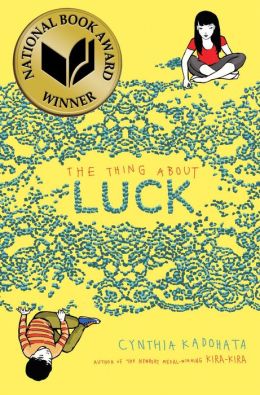 Summer's family is having a year of terrible luck. Summer recently recovered from a freak bout of malaria, her brother is a friendless oddball, and her parents just flew to Japan to care for some elderly relatives. That leaves Summer alone with her grandparents for wheat harvesting season. She's usually just along for the ride, but this year, with her grandmother's back pain worsening and her grandfather slowing down, she finds herself facing a lot more responsibility. To make things worse, she's coming down with her first bout of infatuation. And she has only her copy of A Separate Peace and her grandfather's stories to guide her through this troublesome time.
Summer's family is having a year of terrible luck. Summer recently recovered from a freak bout of malaria, her brother is a friendless oddball, and her parents just flew to Japan to care for some elderly relatives. That leaves Summer alone with her grandparents for wheat harvesting season. She's usually just along for the ride, but this year, with her grandmother's back pain worsening and her grandfather slowing down, she finds herself facing a lot more responsibility. To make things worse, she's coming down with her first bout of infatuation. And she has only her copy of A Separate Peace and her grandfather's stories to guide her through this troublesome time. When Louis Sachar's novel, The Cardturner, came out in 2010, I remember a lot of people saying, "Oh, it's not really a book about bridge!" So I picked it up and gave it a try, and discovered that it is, in fact, a book about bridge. Sachar himself lampshaded that fact by signaling the onset of technical bridge explanations with a whale symbol (a reference to Moby Dick and its notorious technical whaling chapters). He invited the reader to skip those sections if she so chooses. Oh, and I did. But the game of bridge was not effectively quarantined by the whales - it seeped inexorably, unbearably out into the rest of the novel. Or at least the 100 pages I managed to read.
Likewise, I can imagine a defender of The Thing About Luck saying, "But it's not really about combines!" Honey, it is. Not much happens in this book, but what little action there is concerns itself almost exclusively with the wheat harvesting process. There is a lot of information about combines and other large farm equipment here, and, plot-wise, not a whole lot else. It makes Junonia, by Kevin Henkes, look positively action-packed.
That's a shame, because there's some really excellent writing here. The four main characters - Summer, her brother, and the two grandparents - are all expertly drawn. They are infuriating and sympathetic by turns -
real people with real fears. The setting is so vividly described that it almost becomes a character in its own right. When I read Kadohata's descriptions of the stark beauty of the wheat fields, I was reminded of Willa Cather and her passionate portraits of the American West. Like My Antonia, this too is a book concerned about the dignity of hard work, the beauty of desolate places, and the struggle of Americans, new and old, to learn who they are and where they belong.
Unfortunately, this is a collection of wonderful characters and settings in search of a plot. I know that "appeal" is a bad word at the Newbery table, but the criteria do require the book to effectively address its intended audience. I honestly can't imagine the intrepid elementary school kid who would make it past the combines to the quiet beauty hidden in The Thing About Luck.
Publication in June through Atheneum Books (Simon & Schuster)
I'm a sucker for good characters, even if the plot is weak, so I'm looking forward to this one. By the way, sorry about the Newbery - I think (and hope) it's only a matter of time for both you and Sam, though!
ReplyDelete-the other Sam (Bloom)
If you're not much of a plot reader, this book has many admirable qualities. I will be curious to hear your thoughts.
DeleteAnd thanks! Next time, Gadget.